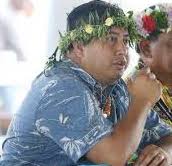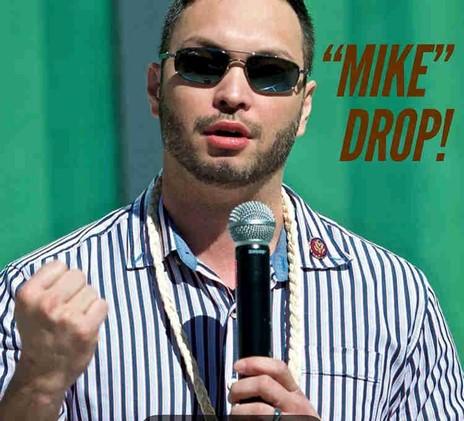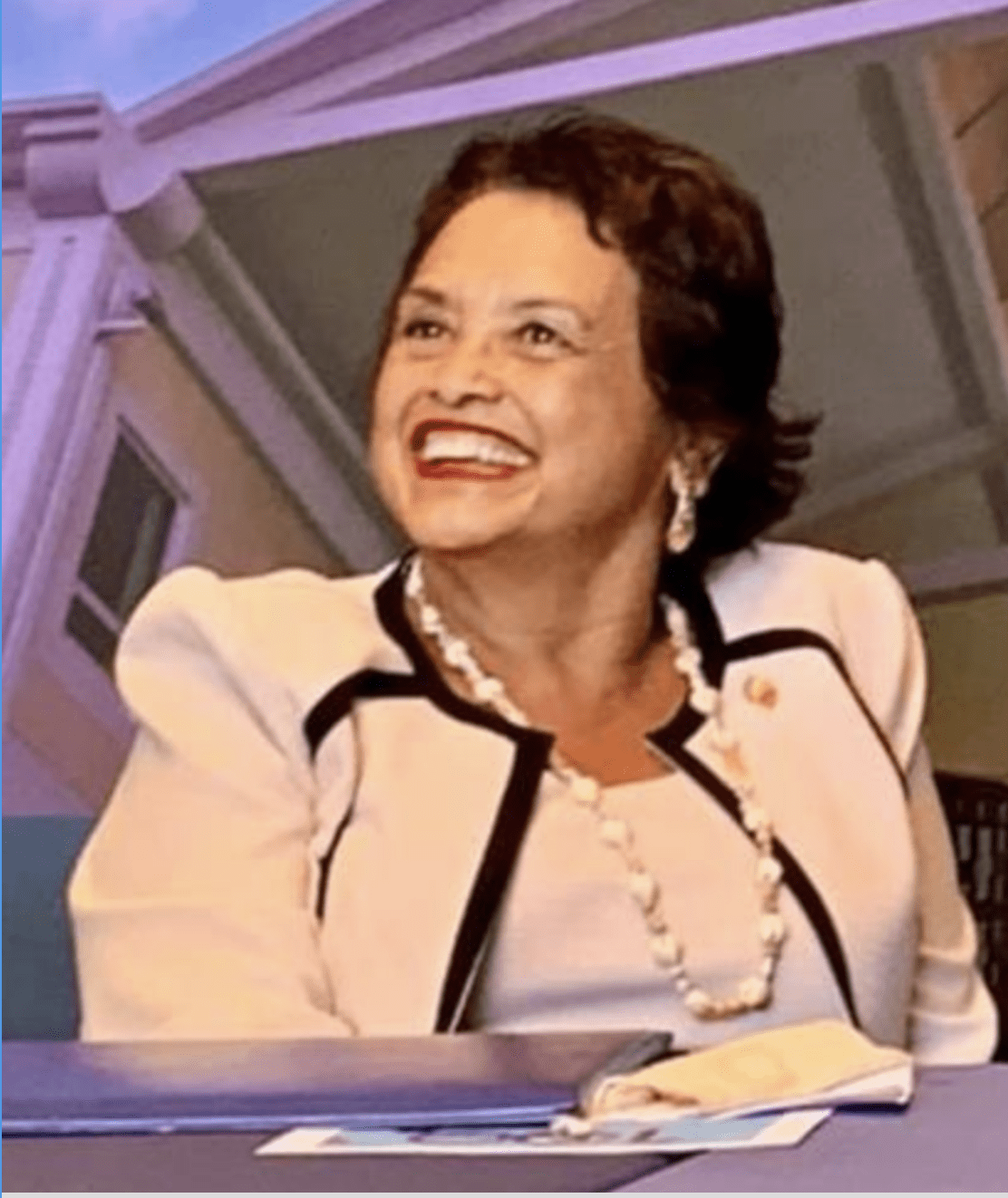 Congressmen Michael San Nicolas and Gregorio “Kilili” Sablan this morning tag teamed Congress in a hearing Kilili held on San Nicolas’s legislation to create opportunities for native Chamorros and Carolinians indigenous to Guam and the Northern Mariana Islands. And while Guam Gov. Lou Leon Guerrero and Speaker Therese Terlaje testified and participated in the hearing, noticeably missing was CNMI Gov. Ralph Torres, and the two leaders of the Commonwealth Legislature.
Congressmen Michael San Nicolas and Gregorio “Kilili” Sablan this morning tag teamed Congress in a hearing Kilili held on San Nicolas’s legislation to create opportunities for native Chamorros and Carolinians indigenous to Guam and the Northern Mariana Islands. And while Guam Gov. Lou Leon Guerrero and Speaker Therese Terlaje testified and participated in the hearing, noticeably missing was CNMI Gov. Ralph Torres, and the two leaders of the Commonwealth Legislature.
House Resolution 6504 by Mr. San Nicolas, and co-sponsored by Mr. Sablan, will create designations of native Chamorros and native Northern Marianas descent that effectively will give these groups greater leverage on federal contracts. This will be accomplished through the U.S. Small Business Administration’s 8(a) program.
The 8(a) Business Development Program–commonly known as the “8(a) Program”–was established by Section 8 of the Small Business Act and is managed by the SBA. This is a nine-year-old program focused on providing businesses owned and controlled by socially and economically disadvantaged groups with training, mentorship, financial and technical assistance, and certain contracting opportunities.
Individuals currently considered “socially disadvantaged” for 8(a) program purposes include African Americans, Hispanic Americans, Asian Pacific Americans, Native Americans (American Indians, Eskimos, Aleuts, or Native Hawaiians), and Subcontinent Asian Americans. Additionally, the program is available to four disadvantaged groups, including Community Development Corporations (CDCs), Indian tribes, Alaska Native Corporations (ANCs), and Native Hawaiian Organizations (NHOs). Although these groups generally do not take part in the programs themselves, businesses that are at least 51% owned by such entities do participate.
H.R.6504 would amend the Small Business Act to include native Chamorro organizations and native Northern Marianas organizations alongside these groups. The legislation notes that, to the extent practicable, the determination of these groups will follow the same model as native Hawaiian organizations.
Leon Guerrero demands funding to staff office
Ms. Leon Guerrero conditioned her support of the measure on an amendment that will appropriate federal funds annually to staff and maintain a registry office.
“About how much do you think you’ll need, governor?” Mr. Sablan asked.
“I haven’t worked out the details, but by my estimation somewhere between $1.5 million to $2 million annually to get that registry and maintain it,” the governor replied.
Mr. San Nicolas explained to the governor his legislation is revenue neutral, which means he is not asking members of Congress to commit federal resources to it. Once legislation asks for an appropriation, it is almost all but certain to be defeated due to the fiscal and political climate in Washington, D.C.
Ms. Terlaje said she would be willing to work with Guam’s senators to provide the local funding needed so long as the federal government authorizes the program, which is the more important feat.
Ms. Leon Guerrero, however, dug in, telling the committee, “I would not be doing my job if I didn’t advocate for the federal resources for this.”
A source within the House Committee on Natural Resources said that what the governor essentially is asking for is a poison pill that “surely will see that this legislation is killed,” if an appropriation is added. “Which would be sad, considering that funding for the government wasn’t the goal at all,” the source said. “This is supposed to be about funding opportunities for struggling companies that are owned by native Chamorros and native Northern Mariana islanders.”
The statements from Mr. San Nicolas, Ms. Leon Guerrero, and Ms. Terlaje follow:
 Mr. San Nicolas’s statement:
Mr. San Nicolas’s statement:
Thank you Mr. Chairman, and greetings to our witnesses present here today. I wish to specifically recognize our Governor of Guam, the Honorable Lou Leon Guerrero, our Speaker of the Guam Legislature the Honorable Therese Terlaje, and Mr. Rob Salas representing our local business community.
Before proceeding Mr. Chairman I would like without objections to place into the record of todays hearing correspondence from the Guam Chamber of Commerce endorsing H.R. 6504, and from the Republican Party of Guam also endorsing H.R. 6504, the legislation we have convened this hearing for today. I would like to recognize Ms. Cathy Castro, President of the Guam Chamber, and Mr. Juan Carlos Benitez, Chairman of the Guam Republican Party, for their leadership in securing these endorsements of the legislation.
Mr. Chairman today is indeed an auspicious day, not only for the fact that we have the leaders of both our senior elected offices on Guam testifying before us, and not only because we have firm consensus in both the public and private sectors as well as our political parties of Guam supporting todays efforts, but more specifically because today we are coming face to face with over 3,500 years of history and over 500 years of colonialism that comprise the history of the native people of Guam, the CHamoru people.
Guam is not just a Territory of the United States. It is the home of the CHamoru people who are indigenous to Guam and are her native inhabitants. I along with the witnesses testifying today all identify as CHamoru, and our lineage is historically traced to prehistoric migration from the Austronesian region over 3,500 years ago. Native CHamorus settled on Guam, built a thriving seafaring society, traded with our neighbors throughout the region, and always regarded Guam as home.
in 1521 a desperate Spanish expedition arrived on Guam’s shores, claimed the island for Spain, and touched off what would be over one hundred years of resistance that our history regards as the CHamoru Spanish Wars. After decimation by disease and conflict the CHamoru were forcibly subjugated on their home island of Guam, but at no time did we ever relinquish our home, our culture, or our identity.
In 1898 the United States acquired Guam as a spoil of war after defeating Spain in the Spanish American War, acquiring the island and the inheriting the indigenous CHamoru, who through our own initiative sought and ultimately attained citizenship in the United States with the passage of the Organic Act of 1950 signed into law by President Harry S. Truman.
Mr. Chairman H.R. 6504 seeks to create a process for we indigenous CHamorus of Guam to be so identified in this federal government, by allowing us to be recognized as Native for those of us who can trace our ancestry back to the pre-citizenship period before 1950. This native recognition we seek in this legislation is not intended to disrupt or encroach on any existing native resources that we on this committee know all to well are insufficient for our native communities. Rather, we simply seek through the passage of H.R. 6504 to be able to be recognized as Native for the purposes of being able to avail of the existing 8(a) program of the Small Business Administration that was created for Native people to be so recognized when doing business with this federal government.
Passage of H.R. 6504, as we will hear from our witnesses today, will enable Native CHamorus – American Citizens – to be rightfully included in the way all native peoples should be, when doing business with the federal government.
The existence of the Native CHamoru is irrefutable, and our place among our native brothers and sisters of this country, in the 8(a) program administered by the SBA is justice in capitalism personified. I humbly ask for the subcommittees support of the passage of H.R. 6504 for this noble purpose, and I yield back the balance of my time.
 Ms. Leon Guerrero’s statement:
Ms. Leon Guerrero’s statement:
Håfa Adai Chairman Grijalva,
Thank you for the opportunity to provide testimony in support of H.R. 6504, to identify Native CHamoru organizations as an eligible disadvantaged group for federal contracting under the Small Business Administration (SBA).
Guam’s population has significantly declined over the last ten years. Results from the 2020 Census reflect an overall 3.5% decrease in the number of local residents. With the disruption to our lucrative tourism industry caused by the COVID-19 pandemic, we look forward to the new business opportunities that this legislation would provide for Native CHamoru organizations. Our decline in population and significant loss in tourism arrivals, in addition to the inequity under federal programs, will adversely affect our ability to generate sustaining economic growth if additional opportunities are not created, especially at this pivotal time for economic recovery.
Many businesses in Guam continue to experience economic loss and hardship stemming from the pandemic. SBA programs such as the Restaurant Revitalization Fund (RRF), Economic Injury Disaster Loan (EIDL), and regular 7(a) loan guaranty programs have been vital in providing necessary economic aid. However, we have noticed the inequitable treatment our people have received within these programs.
For example, of the 297 Guam businesses that applied for funding through the RRF, only about 27% qualified and received RRF funds. Unlike our state counterparts, who have diverse markets to supplement their economies, our food establishments are a large segment of our island’s tourism industry – Guam’s primary industry. Guam is in a unique situation because our recovery is tied to international travel, which continues to be negatively impacted by the COVID-19 pandemic.
Other programs, including the Targeted Economic Injury Disaster Loan and Supplemental Targeted Advance left many of Guam’s businesses without the assistance they need. In order for establishments to avail themselves of these programs, they needed to be located within low-income communities, as identified in the SBA’s mapping tool, which used the latest census data. For Guam, the SBA’s mapping tool did not identify our low-income communities, despite the U.S. Department of Agriculture’s recognition of Guam’s island-wide school district as a high poverty zone in 2018. For the purposes of most federal grant applications, the entire U.S. territory of Guam is considered an underserved and disadvantaged population. This inconsistency has caused many of our business owners to be declared ineligible for funding.
My Administration is prepared to carry out the provisions of this bill requiring the establishment of a genealogy database under the Office of the Governor of Guam to identify individuals as Native CHamorus. Gaining federal recognition is most essential to extend federal contracting opportunities afforded by the SBA to Native CHamoru small businesses, including the 8(a) Business Development Program. In Fiscal Year 2020, 8(a) firms were awarded $34.0 billion in federal contracts, including $9.3 billion in 8(a) set-aside awards and $11.1 billion in 8(a) sole-source awards. Such funding is critical for our small businesses to obtain the training and supplies needed to maintain their operations given the nation’s rise in the cost of goods, and to bolster the island’s rate of employment.
To effectively implement this legislation, we request that an appropriation be included in the bill to adequately provide for the necessary resources that will be required to establish and maintain a Native CHamoru registry. Given the shortfalls caused by the COVID-19 pandemic, we must ensure that our government will have the means to carry out the bill’s provisions effectively. Additionally, we request that an amendment be added to require rules and regulations on how the Office of the Governor will work with SBA to provide information necessary for the determination of whether an organization is a Native CHamoru Organization.
With these recommended changes, this legislation will provide greater parity for our people and allow our small businesses to flourish at the same level as other federally recognized organizations. We would like to recognize Delegate San Nicolas for this initiative, and we thank the Committee for acknowledging the importance of this measure and for giving us the opportunity to have our voices heard.
 Ms. Terlaje’s statement:
Ms. Terlaje’s statement:
Håfa Adai and our warmest greetings from Guam, Honorable Chairman Grijalva, Honorable Vice Chairman Sablan, Honorable Ranking Member Congressman Bentz, and Members of the Committee:
I am Speaker Therese Terlaje of the 36th Guam Legislature, a unicameral body with 15 senators representing a population of 153,836. I introduced Guam Legislature Resolution No. 260-36 (COR) which expresses the support of the Guam Legislature for H.R. 6504. We expect to vote on this resolution later today during our first day of session and will transmit it to your Committee immediately.
Native CHamorus have a history of 4000 years on Guam and the Marianas. Following a 300-year occupation by the Spanish and the Treaty of Paris in 1898, the CHamorus on Guam lived under US Naval rule, followed by civilian governors appointed by the President of the United States. The Native CHamoru suffered a brutal three-year occupation by the Japanese during WWII, land takings by the United States government of almost all of Guam and wherein the US Department of Defense now still occupies and controls one third of our island. In 1950, the US Congress enacted the Organic Act for Guam, and conveyed US Citizenship. Only in 1970 was Guam allowed to elect its first Governor.
Despite our people’s resilience, the CHamorus continue to suffer from the highest incidences of poverty, diabetes, and cancer mortality. Using 2010 census data, 22.5% of all individuals on Guam for whom poverty status was determined were considered to be in poverty, and based on our population data from the 2020 census, 30% of our population was enrolled in Medicaid and 34% of the population qualified for the Supplemental Nutrition Assistance Program (SNAP).
My colleagues and I are in support of H.R. 6504 because it will bring equity in certain federal contracting preferences and training opportunities to Native CHamorus and to the Native CHamoru nonprofit organizations that will be established pursuant to this bill to assist the government in addressing economic and health disparities suffered by Native CHamorus. The success of the current Section 8(a) program and HUBZone programs is evident in helping meet critical needs for Native Hawaiians, Alaskan Natives, and the Native Americans. Again, equity for Native CHamorus will serve a similar purpose.
The definition of Native CHamoru in this bill is tied to 1950 and does not describe the native inhabitants of Guam prior to the 1521 contact with outsiders, prior to the over 300-year occupation by the Spanish, prior to the Treaty of Paris, prior to US Naval rule, prior to World War II occupation of Guam by the Japanese, or prior to the 1950 conveyance by the United States Congress of citizenship on the residents of Guam; but I believe for purposes of this particular small business program that this definition will adequately address the disparity and significantly help to remedy the needs of Native CHamoru businesses of Guam as was the goal of the Section 8(a) programs.
In 2007, CHamoru owned businesses comprised only .01% of all the businesses in the United
States. Currently, there are only seven companies located on Guam that avail of the Section 8(a) program as a minority owned business. Ninety percent of all businesses on Guam are small or micro businesses and report less than $500,000 in annual revenue. Passage of this bill would create incentives for businesses to apply for the 8(a) program because as Super 8(a) businesses, they could continue in the program longer than the 9-year limit and they would benefit tremendously from technical assistance provided by the Small Business Administration. H.R. 6504 would boost Guam’s 8(a) portfolio numbers and thus provide a stronger platform of federal contract opportunities for Native CHamoru firms.Parity for Native CHamorus in federal contracting preferences and community benefits associated with Native CHamoru nonprofit organizations is long overdue and necessary to assist socially disadvantaged and economically disadvantaged groups, as recognized in Congressional findings in establishment of the Section 8(a) and HUBZone programs. We humbly ask for the Committee’s support on H.R. 6504 and hope to see its passage.
Thank you for the opportunity to speak on this important measure. I am happy to provide any additional information requested by the Committee.






